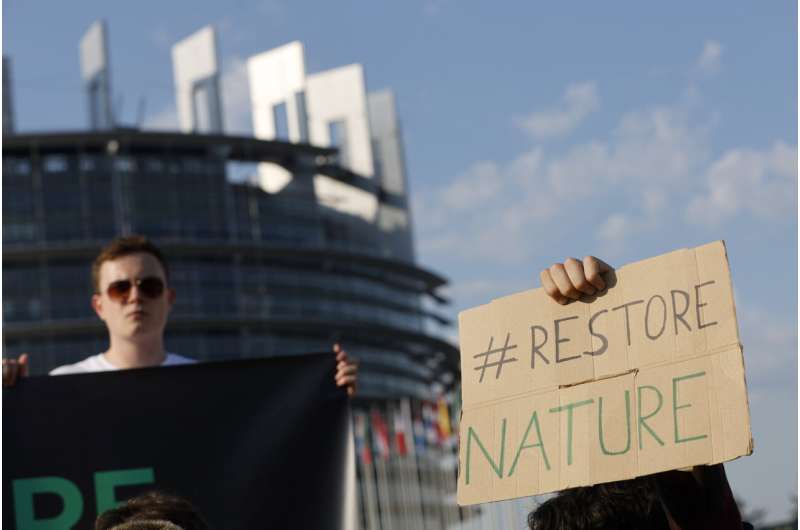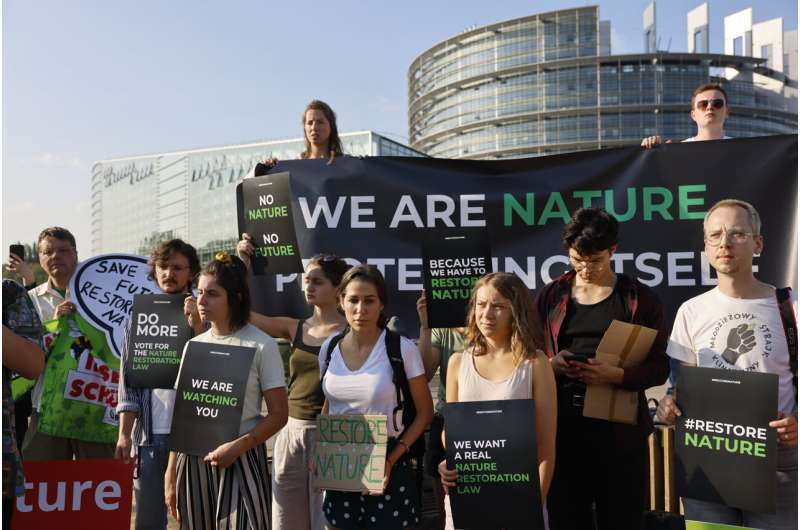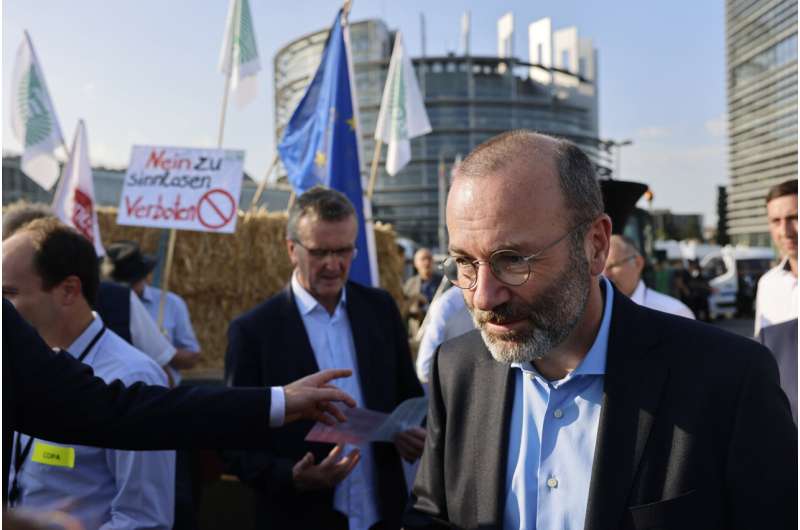Climate activists attend a demonstration outside the European Parliament, Tuesday, July 11, 2023 in Strasbourg, eastern France. Protesters and legislators are converging on the European Union parliament in Strasbourg as the bloc faces a major vote on protecting its threatened nature and shielding it from disruptive environmental change. The vote is a test of the EU's global climate credentials. Credit: AP Photo/Jean-Francois Badias
The European Union's parliament on Wednesday backed a major plan to protect nature and fight climate change in a cliffhanger vote that had the 27-nation bloc's global green credentials at stake.
After weeks of intense lobbying against the plan, the legislature still supported the general outlines of a European Commission bill in a razor-thin 324-312 vote with 12 abstentions to send it onward to negotiations with the member states.
The plan is a key part of the EU's vaunted European Green Deal that seeks to establish the world's most ambitious climate and biodiversity targets and make the bloc the global point of reference on all climate issues.
The vote "marks a significant milestone in our commitment to fulfilling the Green Deal," said MEP Mohammed Chahim of the center-left Socialists and Democrats group.
The plans proposed by the European Commission, the EU's executive branch, set binding restoration targets for specific habitats and species, with the aim to cover at least 20% of the region's land and sea areas by 2030.
Despite the staunch opposition of the legislature's biggest group, the European People's Party, the plan survived in the highly anticipated vote at the European Parliament in Strasbourg, France.
Swedish climate activist Greta Thunberg, third right, and other activists attend a demonstration outside the European Parliament, Tuesday, July 11, 2023 in Strasbourg, eastern France. Protesters and legislators are converging on the European Union parliament in Strasbourg as the bloc faces a major vote on protecting its threatened nature and shielding it from disruptive environmental change. The vote is a test of the EU's global climate credentials. Credit: AP Photo/Jean-Francois Badias
The Christian Democrats' EPP opposition also highlighted the fundamental struggle in Europe on how to deal with climate issues. Despite the succession of droughts, floods and heat waves increasingly hitting countless areas in Europe, the EPP wanted to hit the pause button on such environmental action and concentrate on economic competitiveness first over the next five years.
Together with other conservatives and the far right, it said the plans would undermine food security, fuel inflation and hurt farmers. Thousands of scientists and even multinational companies argued instead to back the proposed plans.
"The disinformation campaign and attempts to derail the Nature Restoration Law from the EPP leadership and their far-right friends has failed," said Greens leader Terry Reintke. "Now is the time to roll up our sleeves and return to constructive and consensus-based politics."
David Nemecek, a senior associate for sustainable finance at climate think tank E3G, said that "although nature has triumphed, the tight margin that led to its victory is worrisome" and saw it as a lack of urgency on nature and climate.
The law implements a landmark agreement reached at the United Nations biodiversity conference in December, where member countries—including the EU—agreed to protect 30% of the world's lands and oceans that are considered especially important for nature.
But the EU's law does not show "additional ambition," Nemecek said.
Chairman of the European People's Party group of the European Parliament Manfred Weber joins farmers supporting the EU's Green Deal proposed bill, outside the European Parliament, Tuesday, July 11, 2023 in Strasbourg, eastern France. Protesters and legislators are converging on the European Union parliament in Strasbourg as the bloc faces a major vote on protecting its threatened nature and shielding it from disruptive environmental change. The vote is a test of the EU's global climate credentials. Credit: AP Photo/Jean-Francois Badias
Hannah Mowat, of the environmental organization Fern, sounded a similar note. She contrasted what she called a "weak" nature law and the bloc's more stringent regulations on deforestation-free products.
"The EU's double standards could be detrimental to its international credibility on climate and biodiversity action," Mowat said in a written statement.
Legislators also voted on more than 100 amendments to make the plan more flexible. The approved amendments will be taken into negotiations with the member states that will take months before a final law can be approved. Nemecek said the amendments aren't expected to greatly affect the "overall objectives" of the law.
The EU's climate czar Frans Timmermans said he was willing to look beyond the disinformation "nonsense" that marred the campaigning against the nature restoration law and was open to find compromises that would also seek to appease the EPP.
Timmermans wants the nature restoration law to be a key part of the Green Deal since it's necessary for maximum impact. Others say that if the EU fails on the nature restoration law, it would indicate an overall fatigue on climate issues.
© 2023 The Associated Press. All rights reserved. This material may not be published, broadcast, rewritten or redistributed without permission.


























